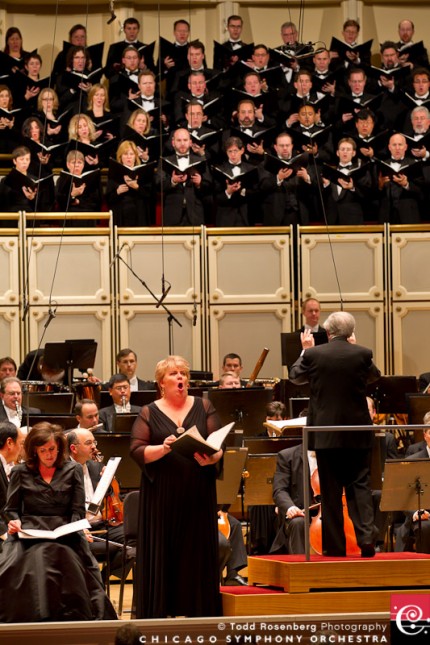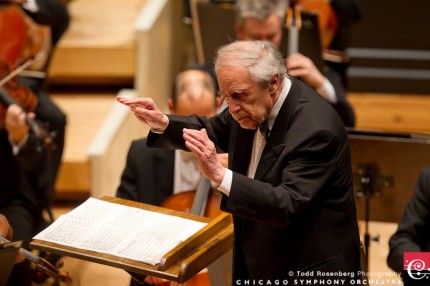Boulez, CSO and Chorus soar in Janáček’s Glagolitic Mass

Soprano Christine Brewer sings as Pierre Boulez conducts the Chicago Symphony Orchestra and CSO Chorus Thursday night in Janáček's "Glagolitic Mass."
Few composers had a more prolific or distinctive late artistic maturity than Leoš Janáček . Partly sparked by his–likely unconsummated–infatuation with a younger married woman, Janáček turned out several masterpieces in his last decade. Among them were the operas Katya Kabanova and The Cunning Little Vixen, his Sinfonietta, and the Glagolitic Mass, which was performed Thursday night by Pierre Boulez and the Chicago Symphony Orchestra and Chorus.
A religious skeptic, Janáček wrote his mass at 72, just two years before his death, more as a declaration of fervent nationalism than any specific religious inspiration. Towards that end, he set the traditional Latin liturgy in an Old Church Slavonic that was already archaic in the early 20th century.
Textually, the often-revised mass has long been known in Janáček’s final version. Frustrated by the inability of musicians to master its complications, the composer greatly simplified the music, sacrificing much of the original arrangement’s bold harmonic writing and angular Moravian rhythms.
For these concerts, Boulez elected to perform the Glagolitic Mass in Paul Wingfield’s recent reconstruction of the original score, which restores the complex time signatures, the three sets of timpani and the extended orchestral passages, greatly pruned in the revised version.
Janáček’s concise mass remains a masterpiece, with the Czech composer bringing his national vocal style and Moravian touches to the traditional Latin text. Boulez’s acute ear for balancing and clarifying textures allowed the originality of the Czech composer’s distinctive writing to register clearly without bombast, as with the tempered brass fanfares of the opening Intrada and a stately elegance to the Uvod movement.
Boulez’s lucid, objectivist approach ensured that even the most outre moments—the three sets of timpani and rapidly alternating passages for brass and chorus—never emerged blowsy or overblown. Still, I would have preferred more raucous bite at times, with the tonal gleam and scrupulous refinement rounding off some of the sharp edges and pungent folk flavor of Janáček’s conception.
Still, this was a superb performance with quite bravura and committed playing by the CSO across all sections, the trumpets a particular standout Thursday night. Boulez’s architectural mastery also showed the effectiveness of Janáček’s original arch-like structure, with the conductor giving extra emphasis to the reprise of the Intrada that closes the work.
Paul Jacobs, back just weeks after his CSO debut in Copland’s Organ Symphony, brought full-tilt virtuosity to the solo organ fireworks in the penultimate Varhany section.
The four vocal soloists fulfilled their assignments with fine aplomb. It was luxury casting to have Christine Brewer’s imposing soprano on hand, cutting through the orchestra with ease. Mezzo Nancy Maultsby and bass Mikhail Petrenko proved admirable in their brief parts, though I would have liked a more commanding tone from the Russian to anchor the quartet.
Most impressive was the young Canadian tenor, Lance Ryan, making his CSO debut. Even with a bit of a wobble, Ryan was the most idiomatic of the four soloists, his febrile and uninhibited vocalism conveying more of the raw, folkish essence of Janáček’s mass than any other element Thursday night.
The CSO Chorus was at their considerable best, which is saying something. Well prepared by Duain Wolfe, the singers brought a glowing corporate tone, the sopranos pure and ethereal in the Gospodi pomiluj, and the entire ensemble nimble in the extended Veruju movement and sonorous and imposing in the Agnece bozij.
Schoenberg’s Verklärte Nacht made an apt precursor for the Janáček mass. Before his 12-tone style, Schoenberg’s music explored the outer limits of Late Romanticism in this work inspired by a melodramatic Richard Dehmel poem of a woman who tells her new lover she is carrying another man’s child, her sorrow, and his forgiveness.
Trite as the source material seems today, Transfigured Night is one of Schoenberg’s greatest achievements, a rich, broad single movement masterfully written for strings with a powerful emotional impact.
One will hear more impassioned renderings of this über-chromatic music than that presented Thursday night under Boulez, but one is unlikely to hear one more transparent or meticulously balanced. The sense of catharsis was more affecting for not peaking too soon, and Boulez’s lightening of the multilayered textures hearkened Verklärte Nacht back to its sextet origins. The CSO strings gave their conductor emeritus playing of uncommon refinement and dynamic nuance led by concertmaster Robert Chen’s delicately hued violin solos.
The program will be repeated 8 p.m. Friday and Saturday. cso.org; 312-294-3000.
